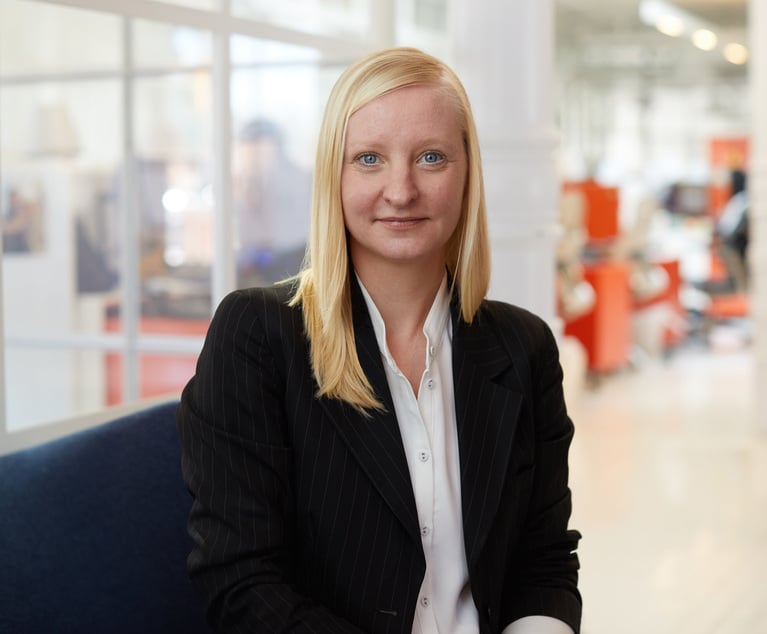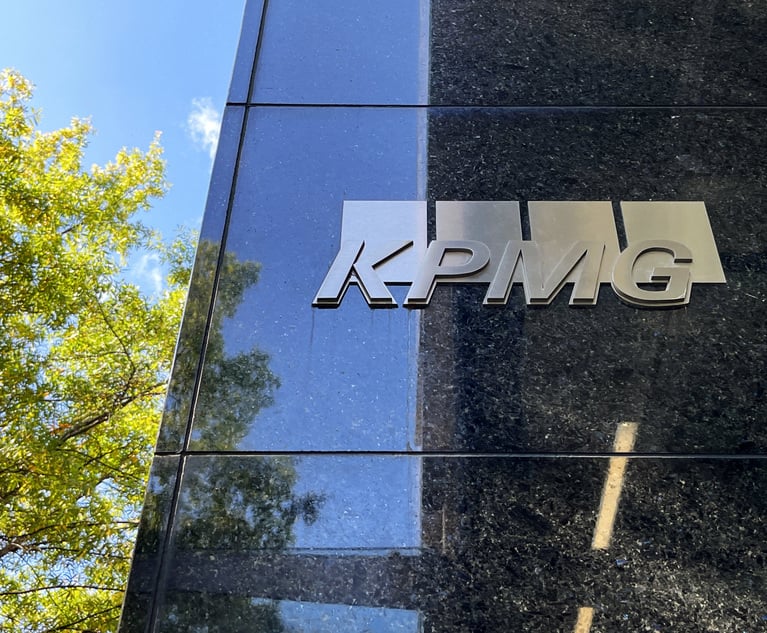Could Africa Leapfrog Other Regions on Legal Technology, Like it Did With Mobile Phones?
Some believe the continent has an opportunity to grow more quickly, in the same way as it did with mobile phone adoption, but a lack of data and law firm scale could be an issue.
February 20, 2024 at 05:20 PM
8 minute read
 Credit: Tero Vesalainen/Shutterstock.com
Credit: Tero Vesalainen/Shutterstock.com With the embrace of legal technology steadily gaining momentum in Africa, some experts predict the possibility of the region surpassing the rest of the world, like it did with the mobile phone revolution.
To the surprise of observers globally, users of mobile phones across Africa grew exponentially from 25 million in 2001 to almost 650 million in the space of 10 years — far more than what was reported in Europe or even the United States.
The revolution is also believed to have spurred the growth of Africa's mobile money market, which is currently worth two-thirds of the global market.
Many believe a big part of the reason for the leap was the fact that landline phones were not as common across Africa, allowing rapid adoption of mobile phones, which were easily affordable and came at the same time as major investment by telecoms companies.
So could a similar thing happen in the field of legal technology?
Steven De Backer, the founder of African-focused legal intelligence company, Afriwise, said the region stands a chance in succeeding in legal technology by creating solutions that promote access to law and justice, as opposed to solutions for law firms.
"Where I strongly believe that Africa will be able to leapfrog compared to the rest of the world is in terms of law tech," he said, defining law tech as solutions that solve a legal problem not addressed by the current legal market.
The former Freshfields Bruckhaus Deringer lawyer explained that a farmer in a remote village in Nigeria whose rights have been violated may not be able to get legal assistance due to the huge gap in access to justice.
"You can actually give a solution to those people. They can just text a chatbot or go on online, and then ask the question, and they will get a response. "
Law firms investing in innovation
Riding on the wave of the possible legal tech revolution, African law firms are also transitioning from leveraging existing tools to serve clients to wanting to innovate and potentially develop their own tools.
Last year, the trio of Bowmans, Webber Wentzel and Cliff Dekker Hofmeyr, disclosed that integrating technology in their processes helped to save up to 50% of their lawyers' time and ultimately resulted in cost savings and increased efficiency.
Lawyers at these firms and others interviewed for this article said the technologies available to them include contract review softwares, E-discovery tools, document management systems, automation tools and more.
Meanwhile, some of the leading firms in the region are taking a significant step forward by investing in Generative AI and other related technologies to create their own products.
For instance, Johannesburg-based Webber Wentzel, a firm in an alliance with Linklaters, recently rebranded its legal technology division with a five-year plan to make substantial investments in artificial intelligence.
The division, now named Webber Wentzel Fusion, will deploy a multidisciplinary team consisting of lawyers, project managers, tech experts, analysts, and paralegals to deliver on legal projects, according to the firm
Aalia Manie, who leads the team, told Law.com International that the decision to rebrand the division is in response to the growing needs of both its lawyers and clients.
"And what we are doing here is to say; What are the problems faced by our lawyers? What pain points do our clients suffer? Which of those are the biggest and the highest priority?"
"We are looking to match our generative AI investments and experimentations and align them to those pain points," she said.
ENS, one of Africa's largest law firms with offices in seven countries, has an intelligence department dedicated to similar interests.
Ridwan Boda, a Partner at ENS and head of the firm's Technology, Media and Telecommunications team, said the intelligence unit is implementing initiatives to help the firm leverage existing AI tools like Chat GPT while also building its own legal tech offering.
"There is already a part of these initiatives that is going to take more focus in the next year or so," he said. Boda also hinted at the possibility of ENS playing in the innovation space in the near future.
This content has been archived. It is available through our partners, LexisNexis® and Bloomberg Law.
To view this content, please continue to their sites.
Not a Lexis Subscriber?
Subscribe Now
Not a Bloomberg Law Subscriber?
Subscribe Now
NOT FOR REPRINT
© 2025 ALM Global, LLC, All Rights Reserved. Request academic re-use from www.copyright.com. All other uses, submit a request to asset-and-logo-licensing@alm.com. For more information visit Asset & Logo Licensing.
You Might Like
View All
The Week in Data Jan. 21: A Look at Legal Industry Trends by the Numbers

Avoiding the Great Gen AI Wrecking Ball: Ignore AI’s Transformative Power at Your Own Risk
6 minute read
The Law Firm Disrupted: Tech Investment Is Necessary Yet Expensive. The Big Four Have a Leg Up

Law Firms Mentioned
Trending Stories
- 1Courts Demonstrate Growing Willingness to Sanction Courtroom Misuse of AI
- 2The New Rules of AI: Part 1—Managing Risk
- 3Change Is Coming to the EEOC—But Not Overnight
- 4Med Mal Defense Win Stands as State Appeals Court Rejects Arguments Over Blocked Cross-Examination
- 5Rejecting 'Blind Adherence to Outdated Precedent,’ US Judge Goes His Own Way on Attorney Fees
Who Got The Work
J. Brugh Lower of Gibbons has entered an appearance for industrial equipment supplier Devco Corporation in a pending trademark infringement lawsuit. The suit, accusing the defendant of selling knock-off Graco products, was filed Dec. 18 in New Jersey District Court by Rivkin Radler on behalf of Graco Inc. and Graco Minnesota. The case, assigned to U.S. District Judge Zahid N. Quraishi, is 3:24-cv-11294, Graco Inc. et al v. Devco Corporation.
Who Got The Work
Rebecca Maller-Stein and Kent A. Yalowitz of Arnold & Porter Kaye Scholer have entered their appearances for Hanaco Venture Capital and its executives, Lior Prosor and David Frankel, in a pending securities lawsuit. The action, filed on Dec. 24 in New York Southern District Court by Zell, Aron & Co. on behalf of Goldeneye Advisors, accuses the defendants of negligently and fraudulently managing the plaintiff's $1 million investment. The case, assigned to U.S. District Judge Vernon S. Broderick, is 1:24-cv-09918, Goldeneye Advisors, LLC v. Hanaco Venture Capital, Ltd. et al.
Who Got The Work
Attorneys from A&O Shearman has stepped in as defense counsel for Toronto-Dominion Bank and other defendants in a pending securities class action. The suit, filed Dec. 11 in New York Southern District Court by Bleichmar Fonti & Auld, accuses the defendants of concealing the bank's 'pervasive' deficiencies in regards to its compliance with the Bank Secrecy Act and the quality of its anti-money laundering controls. The case, assigned to U.S. District Judge Arun Subramanian, is 1:24-cv-09445, Gonzalez v. The Toronto-Dominion Bank et al.
Who Got The Work
Crown Castle International, a Pennsylvania company providing shared communications infrastructure, has turned to Luke D. Wolf of Gordon Rees Scully Mansukhani to fend off a pending breach-of-contract lawsuit. The court action, filed Nov. 25 in Michigan Eastern District Court by Hooper Hathaway PC on behalf of The Town Residences LLC, accuses Crown Castle of failing to transfer approximately $30,000 in utility payments from T-Mobile in breach of a roof-top lease and assignment agreement. The case, assigned to U.S. District Judge Susan K. Declercq, is 2:24-cv-13131, The Town Residences LLC v. T-Mobile US, Inc. et al.
Who Got The Work
Wilfred P. Coronato and Daniel M. Schwartz of McCarter & English have stepped in as defense counsel to Electrolux Home Products Inc. in a pending product liability lawsuit. The court action, filed Nov. 26 in New York Eastern District Court by Poulos Lopiccolo PC and Nagel Rice LLP on behalf of David Stern, alleges that the defendant's refrigerators’ drawers and shelving repeatedly break and fall apart within months after purchase. The case, assigned to U.S. District Judge Joan M. Azrack, is 2:24-cv-08204, Stern v. Electrolux Home Products, Inc.
Featured Firms
Law Offices of Gary Martin Hays & Associates, P.C.
(470) 294-1674
Law Offices of Mark E. Salomone
(857) 444-6468
Smith & Hassler
(713) 739-1250








